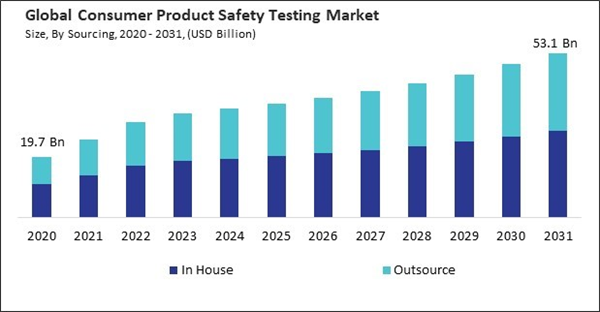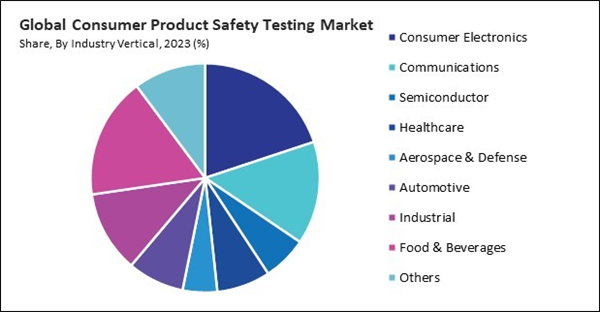Automotive manufacturers must uphold high standards of quality and reliability. Product safety testing helps identify design flaws, manufacturing defects, or performance issues early in development, ensuring that vehicles and components meet reliability and safety expectations. The automotive segment acquired $2.68 billion revenue in the market in 2023. Ensuring the safety of drivers and passengers is paramount in the automotive industry. Safety testing aids in identifying potential hazards, assessing crashworthiness, and evaluating the performance of safety systems like seat belts and airbags to reduce the likelihood of injuries during accidents.
As consumers become more informed about the potential risks associated with unsafe products, they demand higher safety standards. This heightened awareness leads consumers to prefer products thoroughly tested for safety, compelling manufacturers to invest in comprehensive safety testing to meet market expectations. Increased awareness of health issues, such as allergies, chemical sensitivities, and other health risks associated with consumer products, has made safety testing more critical. Thus, increased awareness about product safety is driving the market's growth.
Moreover, the consumer electronics industry encompasses many products, such as smartphones, tablets, laptops, wearable devices, home appliances, and gaming consoles. Every consumer electronics category necessitates tailored safety testing to meet regulatory standards and ensure the products' safety, reliability, and performance. According to the National Investment Promotion & Facilitation Agency, India’s domestic electronics production has increased at a rate of 13% from $49 Bn in FY17 to $101 Bn in FY23. New technologies such as AI, AR/VR, 5G connectivity, and IoT introduce complexities that require specialized safety testing protocols. Thus, expansion of the consumer electronics Industry is driving the market's growth.
However, Comprehensive safety testing involves significant expenses related to equipment, facilities, skilled personnel, and compliance with stringent regulatory standards. These costs can be particularly burdensome for small and medium-sized enterprises (SMEs) with limited financial resources. As a result, some manufacturers may opt for minimal testing or delay testing processes, potentially compromising product safety. Limited budgets and resources can restrict their ability to conduct thorough testing, potentially hindering market entry or growth. Hence, the high cost of product safety testing is impeding the market's growth.
Driving and Restraining Factors
Drivers- Increased Awareness About Product Safety
- Demand For Interoperability Testing
- Expansion Of the Consumer Electronics Industry
- High Cost of Product Safety Testing
- Complexity In Testing Requirements
- Increasing Regulatory Compliance
- Focus On Cybersecurity Testing
- Risk Of Counterfeit Testing Services
- Skills Gap in Testing Expertise
Industry Vertical Outlook
By industry vertical, the consumer product safety testing market is divided into communications, semiconductor, aerospace & defense, consumer electronics, automotive, healthcare, industrial, food & beverages, and others. In 2023, the healthcare segment held 8% revenue share in the market. Prioritizing patient safety is crucial in healthcare. Products ranging from medical equipment to pharmaceuticals must undergo rigorous testing to identify potential hazards, ensure proper functioning, and mitigate risks associated with their use.Sourcing Outlook
On the basis of sourcing, the market is segmented into in-house and outsource. The in-house segment recorded 54% revenue share in the market in 2023. One of the primary reasons companies opt for in-house testing is to maintain control over the entire testing process. By conducting testing internally, companies have direct oversight of procedures, protocols, and timelines. This control allows them to tailor testing methodologies to specific product requirements, ensuring thorough and customized assessments.Offering Outlook
Based on offering, the market is divided into electrical safety, connectivity, electronics testing, energy efficiency testing, electromagnetic compatibility, and others. The energy efficiency testing segment attained 15% revenue share in the market in 2023. Governments worldwide increasingly implement stringent energy efficiency regulations to promote sustainability and reduce energy consumption. Products such as appliances, lighting,Regional Outlook
Region-wise, the market is analyzed across North America, Europe, Asia Pacific, and LAMEA. The North America region witnessed 36% revenue share in the market in 2023. North America, particularly the United States and Canada, maintains rigorous regulatory frameworks for product safety. Entities such as the Consumer Product Safety Commission (CPSC) in the U.S. and Health Canada establish rigorous standards that products must adhere to before being eligible for sale or distribution.Recent Strategies Deployed in the Market
- 2024-Mar: Bureau Veritas S.A. has finalized acquisitions of ONETECH Corp. and KOSTEC Co., Ltd in Korea, and Hi Physix Laboratory India Pvt. Ltd in India, aiming to bolster its Consumer Products Services in South and North-East Asia, tapping into growing regulatory demands and expanding its technological market presence.
- 2024-Jan: DEKRA introduces the upgraded DEKRA Adaptive Suite, an integrated EHS safety management system offering five configurable applications: Document Management, Training, Incident Reporting, Maintenance Management, and Audit Management, aiming to streamline safety management and enhance compliance across industries.
- 2024-Jan: Bureau Veritas S.A. introduces the BV Green Mark, certifying sustainable attributes like composability, durability, carbon footprint, and chemical content in consumer products, meeting the growing demand for eco-friendly choices and ESG alignment.
- 202-Oct- DEKRA has completed the acquisition of Weiss Technik Testing Services' environmental testing laboratories in Michigan, enhancing its product testing capabilities in North America. This strategic move strengthens DEKRA's position in various industries, particularly automotive, with expanded services like temperature, humidity, and vibration testing.
- 2023-Jun-DEKRA SE launches AI Testing and Certification services to ensure safety and security in AI-powered products, addressing regulatory gaps with its global expertise. DEKRA aims to establish trust and compliance across the evolving AI landscape.
- 2020-Sep: Bureau Veritas S.A. and OSMOS Group have formed a strategic partnership to enhance structural health inspection and monitoring services for buildings and infrastructure. The partnership integrates OSMOS' advanced analytics and optic fiber-based sensors with Bureau Veritas' global reach and industry expertise.
List of Key Companies Profiled
- Bureau Veritas S.A.
- DEKRA SE
- DNV AS
- Intertek Group PLC
- ALS Limited
- Eurofins Scientific SE
- ABS Group
- Element Materials Technology (Temasek Holdings)
- Applied Technical Services, LLC
- NSL Analytical Services, Inc.
Market Report Segmentation
By Sourcing- In House
- Outsource
- Electronics Testing
- Electrical Safety
- Connectivity
- Energy Efficiency Testing
- Electromagnetic Compatibility
- Others
- Consumer Electronics
- Communications
- Semiconductor
- Healthcare
- Aerospace & Defense
- Automotive
- Industrial
- Food & Beverages
- Others
- North America
- US
- Canada
- Mexico
- Rest of North America
- Europe
- Germany
- UK
- France
- Russia
- Spain
- Italy
- Rest of Europe
- Asia Pacific
- China
- Japan
- India
- South Korea
- Australia
- Malaysia
- Rest of Asia Pacific
- LAMEA
- Brazil
- Argentina
- UAE
- Saudi Arabia
- South Africa
- Nigeria
- Rest of LAMEA
Table of Contents
Companies Mentioned
- Bureau Veritas S.A.
- DEKRA SE
- DNV AS
- Intertek Group PLC
- ALS Limited
- Eurofins Scientific SE
- ABS Group
- Element Materials Technology (Temasek Holdings)
- Applied Technical Services, LLC
- NSL Analytical Services, Inc.










